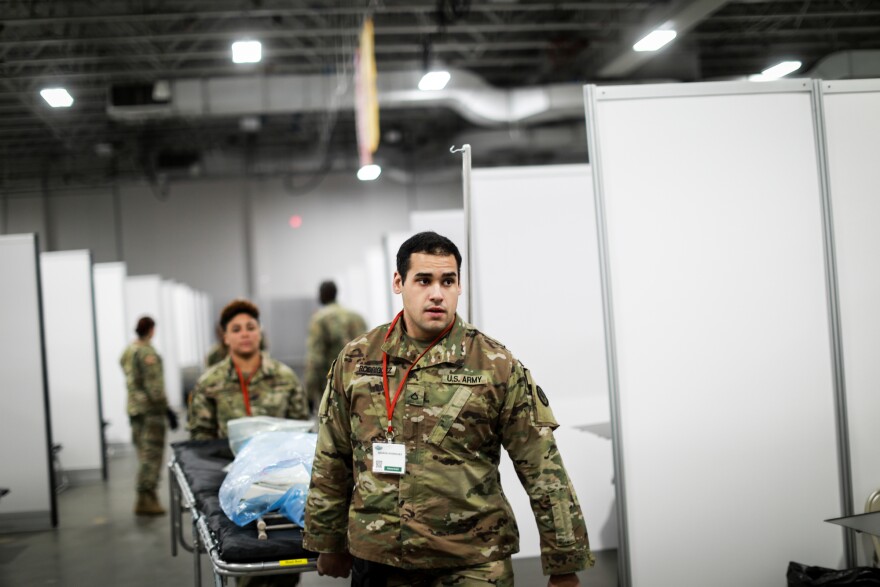New Jersey reported 3,528 new COVID-19 cases on Monday, bringing the state total to 88,806 cases.
Another 177 New Jersey residents died as a result of coronavirus for a total of 4,377 fatalities.
Hospital discharges outpace new admissions
The rate of new hospitalizations of those sickened with COVID-19 is slowing in New Jersey, a positive sign that officials said showed the statewide stay-at-home order was succeeding at slowing the spread of the coronavirus.
“It means that our healthcare system is in a better position to get ahead and stay ahead,” Murphy said. “It means that our aggressive social distancing efforts are having their desired effects.”
As of Monday, there were 6,986 hospitalized coronavirus patients in New Jersey, with 2,018 of them requiring critical or intensive care.
Officials said they were pleased that hospitals were discharging more patients than they were admitting new ones for COVID-19. They say data show that hospital discharges outpaced new admissions last week for the first time since the coronavirus outbreak took hold in the Garden State.
“Please God may it stay that way,” Murphy added. “This did not happen by accident. We planned, we worked, and we collaborated.”
Eight prisoner deaths highlight crisis in N.J. prisons
Eight people have now died of COVID-19 in New Jersey prisons, and criminal justice advocates say the administration of Gov. Phil Murphy should do more to protect people behind bars.
Although Murphy signed an executive order on April 10 approving the release of certain prisoners to slow the spread of the virus in state-run prisons, none has been released, according to the state.
“On the one hand the executive order purports to recognize the urgent need for the release of people in prison, and that’s good,” said Alex Shalom, a senior staff attorney with the ACLU-NJ.
“But on the other hand, the time frame that’s set forth in the EO and under which the Department of Corrections has been acting suggests no urgency and suggests that they’re more concerned about people getting out than people dying inside.”
Matthew Schuman, a spokesman for the New Jersey Department of Corrections, said the work of reviewing inmate case files to determine who is eligible for home confinement is ongoing.
Under Murphy’s executive order, prisoners 60 years old and older, those who have underlying medical conditions that make them more vulnerable to COVID-19, and those who were denied parole in the last year or who are set to be released or face parole eligibility in the next 90 days would qualify for release.
Those convicted of the most serious offenses, such as murder and rape, would stay incarcerated.
Once the Department of Corrections prepares lists of eligible prisoners, a special committee has seven days to provide recommendations on the release of each person. Prosecutors offices have five days after the list is produced to contest the release of a given inmate. Once the committee makes its recommendations, Corrections Commissioner Marcus Hicks has three days to accept or reject the guidance.
Sixty-three New Jersey prisoners and 309 correctional staff members have tested positive for COVID-19, according to state data.
Murphy to announce plan to reopen the state “in the coming days”
Murphy said he would announce “in the coming days” what benchmarks the state would have to meet before it reopened and what principles would guide his administration as it began to recover from the worst of the coronavirus pandemic so far.
“However do not think for one minute that we’re going to be able to flip a switch and return to life as we knew it,” he added.
Murphy said the state would require federal help to ramp up a large-scale testing regime necessary for reopening, and that he would take pains to avoid a “second boomerang” wave of COVID-19 that public health experts have warned is possible.
New Jersey has partnered with New York, Pennsylvania, Delaware, Connecticut, Rhode Island, and Massachusetts to develop a regional strategy for reopening their economies, so that one state’s policies don’t have negative ripple effects on another.
But Murphy warned that he would not sacrifice public health for the sake of the economy, and said it would be folly to believe residents would want to step back into public life while coronavirus infections were still on the rise.
“Personal health creates economic health,” Murphy said. “It has to happen in that order”
Historical cuts to N.J. agencies hampers COVID-19 response: report
The COVID-19 outbreak in New Jersey has shone a “glaring spotlight” on disinvestment in some of the state government’s key departments, according to a new report from the progressive think tank New Jersey Policy Perspective.
In response to the Great Recession of 2008, former Gov. Chris Christie and state lawmakers cut funding to state agencies and programs and reduced staffing levels by more than 20% — and funding for some of those departments has yet to fully rebound, the analysis found.
For example, the report said the Department of Community Affairs saw a 42% funding decrease, the Departments of Health and Human Services saw a 6% decline in funding and a 30% staffing reduction, and the Department of Labor and Workforce Development saw its staffing levels dip 25% even as its funding has gone up over the last decade.
“The crisis has put a glaring spotlight on the damage done by a decade of government disinvestment,” the report said. “Scaling back essential government services should not be an option, as the safety net programs administered by New Jersey’s departments and agencies will act as the foundation for the state’s ultimate recovery.”
The report recommended raising revenue to plug the budget holes by making the state’s income tax more progressive and extending the increase on the state’s corporate business tax surcharge. Before the pandemic hit, Gov. Murphy had already been arguing with legislative leaders about raising the income tax rate for millionaires.


